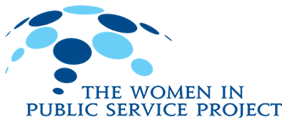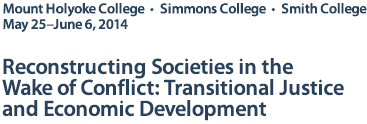A Local Look at Global Problems
WPSP Institute delegates visit Holyoke to learn about the obstacles and opportunities in an urban American community
By Jane Falla
For WPSP Institute delegates like Sadia Farid of Pakistan and Rini Maryam of Indonesia, a visit to Holyoke was eye-opening. After hearing from a dozen people involved in public service there, many delegates mentioned they had never imagined there were small urban communities in the United States struggling with economic, political and cultural challenges similar to those they face in their conflict-ridden countries.
Speakers included Kathleen Anderson, president of the Greater Holyoke Chamber of Commerce, which helps spur business development and renewal programs in the city; Anne Teschner, executive director of The Care Center, which assists teen mothers in finishing high school and pursuing college; Suzanne Parker, executive director of Girls Inc., which offers programs to foster girls’ involvement in the STEM (science, technology, engineering and math) subjects; and Hilda Roque, Executive Director of Nuestras Raíces, a grassroots agriculture organization. They all pointed to problems that sounded hauntingly familiar to the delegates: poverty, division, lack of education, drugs, violence and economic disadvantage.
Maria Cartagena, assistant director of student programs at Amherst College, and Alan Bloomgarden, director of community engagement at Mount Holyoke College, spoke to delegates about how academic institutions can give back to their communities by offering an exchange of ideas, knowledge and opportunities, while communities in turn can provide unique reality-based and practical experiences for students. Bloomgarden said he works to help academic institutions and community nonprofit organizations build bridges. “It’s challenging, as communities often aren’t unified in what they want and institutions aren’t always receptive to community-based learning as the most rigorous form of academic learning.”
Cartagena shared candid thoughts about Holyoke’s history, incorporating her own experiences as part of its Puerto Rican population, which is now roughly half of the city’s 40,000 residents. Unfortunately, Cartagena noted, immigrants began coming to Holyoke in large numbers just as the economy started to rapidly decline.
Once wealthy and thriving, Holyoke was one of the first planned industrial cities in the United States, with thriving mills that produced textiles and paper. As companies left the area and industries folded, the city became economically depressed, with no recovery plans in place.
In 1999 the city created a master plan envisioning ways to repurpose the community. A new transportation building and renovated library are two projects that have evolved, along with affordable housing and other urban renewal strategies intended to spur progress.
Finding funding is a universal problem. Alicia Zoeller, deputy administrator of the Office of Community Development, shared statistics about decreased funding and staffing while needs, conversely, are rising as more families live at the poverty level, and the hardest hit families are concentrated in two communities of Holyoke, meaning they need a higher level of services.
For funding, Vitek Kruta, who founded Gateway City Arts, encouraged delegates to seek resources from family, friends, neighbors and volunteers who believe in their mission and work.
Afghanistan delegate Farrukh Sultani and Palestine delegate Amal Sabawi were particularly interested to hear that many programs here are funded by the state and federal government. Zoeller explained that funding is, however, highly regulated, which reduces fraud and misuse but can also create enormous obstacles in facing day-to-day realities.
The majority of delegates working in NGOs or other community organizations rely solely on international funds. And in some cases, as one delegate noted, the government not only doesn’t offer financial support, but the government is the problem.
“I learned that we need to understand how to ask for support and have processes in place to eliminate corruption,” Sultani said.
The delegates and speakers also discussed that community development involves engaging all members of the community, especially those who are marginalized, such as women, teens and the elderly. A stop at Gateway City Arts and Nuestras Raíces community gardens offered sparks of hope.
Nuestras Raíces Director Roque reflected on being an immigrant outsider and the challenges she first experienced in getting women involved, especially in a male-dominated Puerto Rican culture. Out in the community, she discovered a treasure trove of talent, she said. “You ignite one woman, and boy, what it can do!”
Kruta spoke of the power of thriving arts and entrepreneurial projects and of giving youth a safe place to explore their talents and passions so they can learn what they enjoy doing and build skills. “In my mind, it’s absolutely essential in order to have better societies.”
Added Roque, “Creativity, innovation and partnership—this is what works.”
Photo by Junmanee Cadenhead ’16


